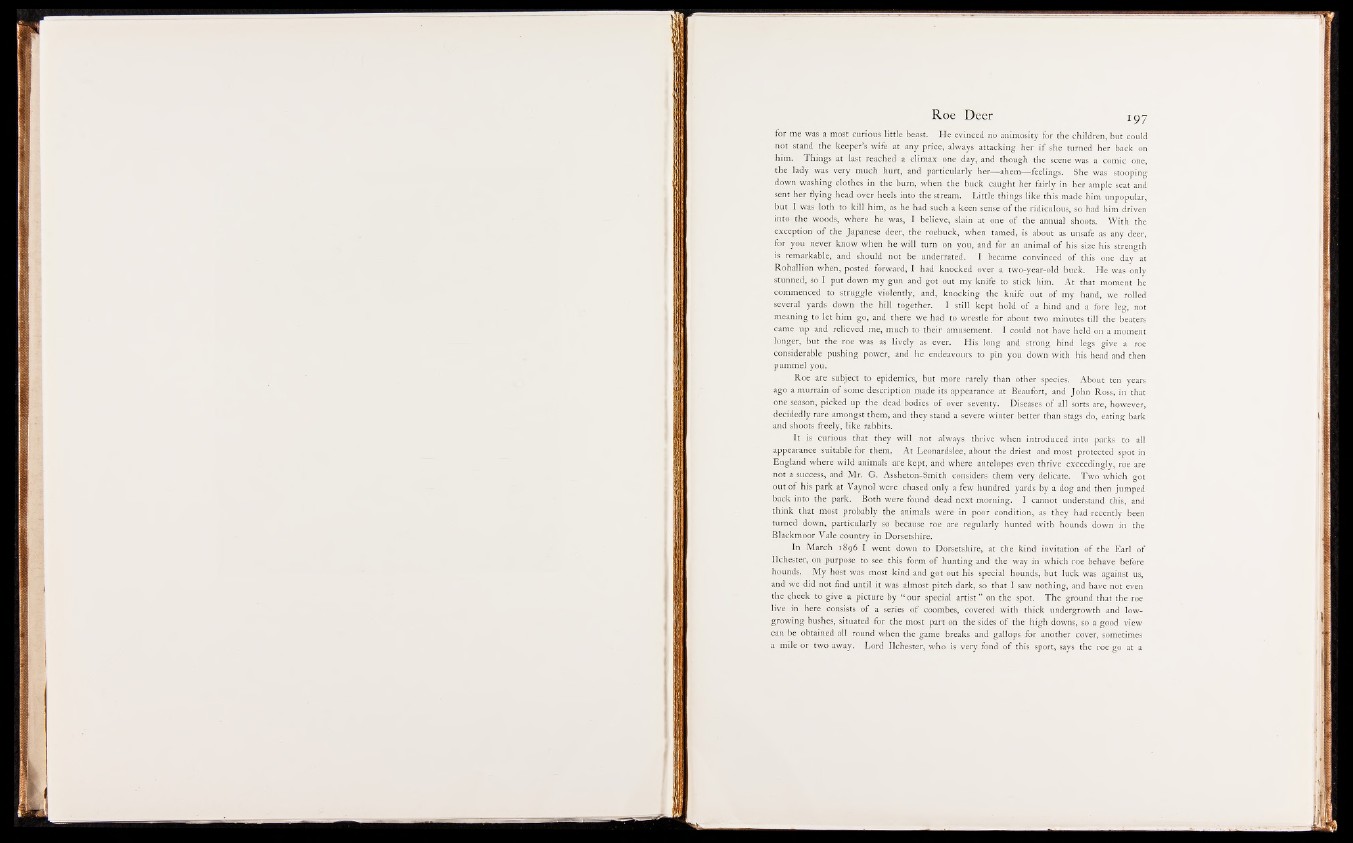
Roe Deer 197
for me was a most curiouiiffttle beast. He evinced no animosity for the children, but could
not stand the keeper’s wife at any price, always attacking her i f she turned her back on
him. Things at last reached a climax one day, and though the scene was a comic one,
the lady was very much hurt, and particularly her— ahem— feelings. She was stooping
down washing clothes in the burn, when the buck caught her fairly in her ample seat and
sent her flying head over heels into the stream. Little things like this made him unpopular,
but I was loth to kill him, as he had such a keen sense o f the ridiculous, so had him driven
into the woods, where he was, I believe, slain at one o f the annual shoots. With the
exception o f the Japanese deer, the roebuck, when tamed, is about as unsafe as any deer,
for you never know when he will turn on you, and for an animal o f his size his strength
is remarkable, and should not be underrated. I became convinced o f this one day at
Rohallion when, posted forward, I had knocked over a two-year-old buck. He was only
stunned, so I put down my gun and got out my knife to stick him. A t that moment he
commenced to|||truggle violently, and, knocking the knife out o f my hand, we rolled
several yards down the hill together. I still kept hold o f a hind and a fore leg, not
meaning to let him go, and there we had to wrestle for about two minutes till the beaters
came up and relieved me, much to their amusement. I could not have held on a moment
longer, but the roe was as lively as ever. His long and strong hind legs give a roe
considerable pushing power, and he endeavours to pin you down with his head and then
pummel you.
Roe are subject to epidemics, but more rarely than other species. About ten years
ago a murrain o f some description made its appearance at Beaufort, and John Ross, in that
one season, picked up the dead bodies o f over seventy. Diseases o f all sorts are, however,
decidedly rare amongst them, and they stand a severe winter better than stags do, eating bark
and shoots freely, like rabbits.
It is curious that they will not always thrive when introduced into parks to all
appearance suitable for them. A t Leonardslee, about the driest and most protected spot in
England where wild animals are kept, and where antelopes even thrive exceedingly, roe are
not a success, and Mr. G. Assheton-Smith considers them very delicate. Two which got
out o f his park at Vaynol were chased only a few hundred yards by a dog and then jumped
back into the park. Both were found dead next morning. I cannot understand this, and
think that most probably the animals were in poor condition, as they had recently been
turned down, particularly so because roe are regularly hunted with hounds down in the
Blackmoor Vale country in Dorsetshire.
In March 1896 I went down to Dorsetshire, at the kind invitation o f the Earl o f
Ilchester, on purpose to see this form o f hunting and the way in which roe behave before
hounds. M y host was most kind and got out his special hounds, but luck was against us,
and we did not find until it was almost pitch dark, so that I saw nothing, and have not even
the qheek to give a picture by “ our special artist” on the spot. The ground that the roe
live in here consists o f a series o f coombes, covered with thick undergrowth and low-
growing bushes, situated for the most part on the sides o f the high downs, so a good view
can be obtained all round when the game breaks and gallops for another cover, sometimes
a mile or two away. Lord Ilchester, who is very fond o f this sport, says the roe go at a